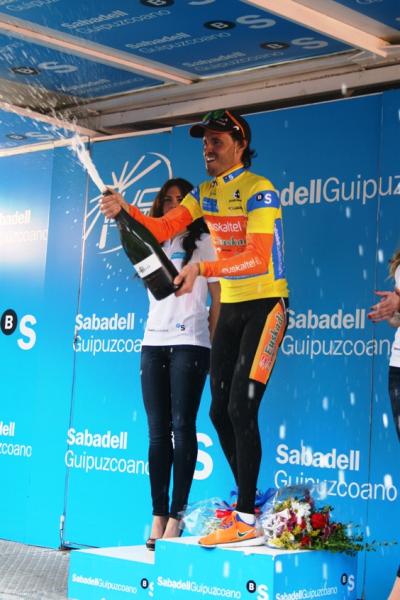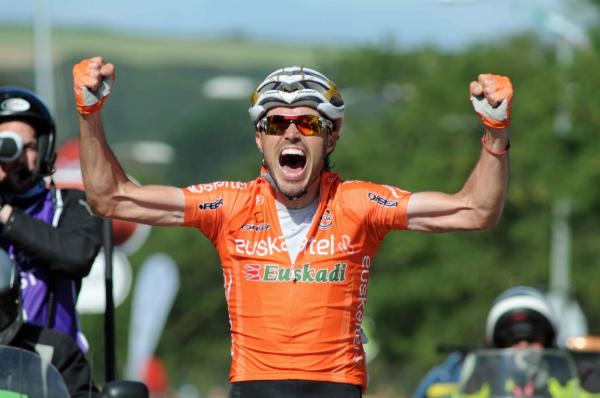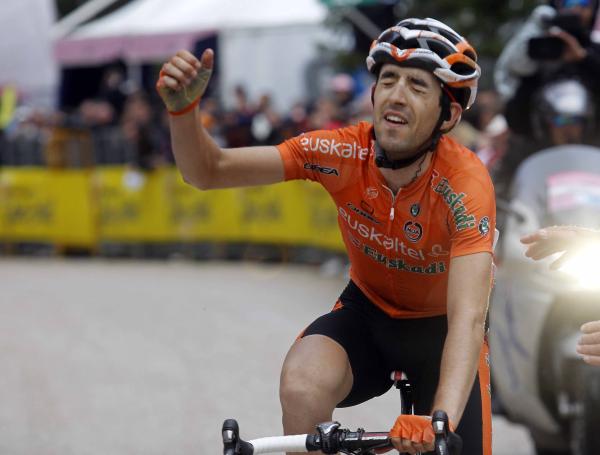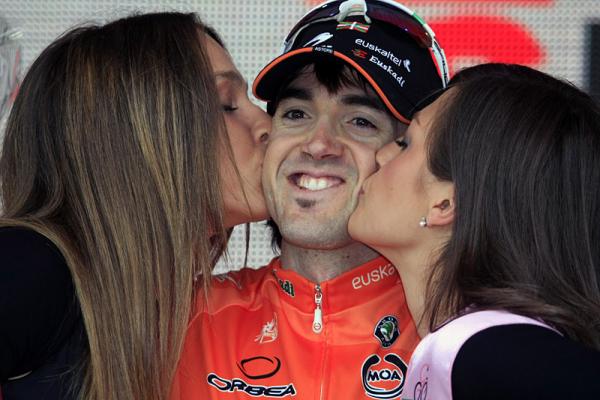2012 Report Card: Euskaltel-Euskadi
Lacklustre second half necessitates "second cycle"




For Euskaltel-Euskadi, 2012 was a season in which what few highlights there were came in the first half of the season, and a lacklustre second part was overshadowed by the build-up towards the biggest change in the team's history since its inception in 1994. In 2013, for the first time ever riders - eight of them, no less - with no sporting connection whatsoever to the Basque Country will race for the team, a change in the squad's overall philosophy which will change its personality.
In some ways it was always going to be tough to repeat Euskaltel-Euskadi's 2011 season where they took two stunning Giro d'Italia mountain wins - their first ever stages in that race - as well as the King of the Mountains title and a stage victory in Luz Ardiden in the Tour de France. Winning in the same finish where Roberto Laiseka had won their first Tour stage ten years previously seemed unbeatable in terms of emotionally charged victories - until Igor Anton stormed away on the hills above Bilbao to claim the win on the day that the Vuelta made its long overdue return to the Basque Country.
2012 looked likely, initially, to be equally successful, with Samuel Sanchez taking Euskaltel-Euskadi's first win in the Vuelta al País Vasco, the Basque Country's flagship event (and Spain's second biggest stage race), in nearly a decade. Then when Ion Izaguirre scored a solid stage win in the Giro d'Italia, combined with Mikel Nieve's tenth place overall and third place on the Stelvio stage, the orange squad looked set for an equally brilliant season.
However, Nieve's fifth place in the Tour de Suisse was the last landmark result on the international calendar as Sanchez crashed out of the Tour de France, missed out on the Olympic road race (where he was defending champion), crashed again in late August and injured his collarbone, then Anton failed to find a good vein of form at the Vuelta and finished ninth.
This low key finale to the season provided a somewhat sombre backdrop to the departure of longstanding team manager and Euskaltel alma mater Miguel Madariaga, with former Vuelta runner-up Igor Gonzalez de Galdeano replacing him. Looking to rebuild itself in a more standard professional team format, E-E then separated itself from its longstanding umbrella organisation, the Euskaltel Foundation. It then made it into the World Tour in the first round of admissions, but only after a bitter struggle for WorldTour points that saw them try (and fail) to sign Oscar Freire and finally opt for eight almost completely unknown riders from countries as far afield as Greece, Russia, Germany and Morocco to boost their points total.
What to expect in 2013
Euskaltel-Euskadi leader Samuel Sanchez opting for the Giro d'Italia for the first time since 2005 could be one of the most unpredictable storylines of the 2013 season. If Sanchez delivers a reasonably strong time trial performance (and he has won them in the past in the Vuelta, let's not forget) in the long first week race against the clock then he could be in with a serious chance of a podium finish or even better. If that plan fails work out, then Sanchez could be a king-maker role amongst Wiggins et al in the mountain stages.
The latest race content, interviews, features, reviews and expert buying guides, direct to your inbox!
As for the rest of the season, Mikel Nieve is expected to fly the Euskaltel flag in the Tour and Igor Anton in the Vuelta. Nieve could well be a surprise guest in the battle for the overall in the Tour de France, whilst Anton's chances of a top-three plaing in the Vuelta will hardly ever be better. On paper, though, an experienced, ultra-canny rider like Sanchez is the most likely of the three to get to stand on a podium this year.
Best signing
Cadiz-born Juan Jose Lobato, formerly with Andalucia, is one of the most promising young Spanish riders in an increasingly empty-looking landscape for the next generation of local amateurs. A winner of two stages of the Tour of Chile and one of Quinghai Lake - this year Euskaltel will probably be expecting him to boost their victorie tally in the lower category Spanish events like Castilla y León and the Tour of Mallorca.
The eight riders from outside Spain are a mixed bag. The rider who has shone the brightest internatinoally is 29-year-old Ricardo Mestre, winner of the Tour of Portugal - his home race - and two stages in 2011, whilst Jure Kocjan of Slovenia has racked up two stages of the Tour de Limousin, the GP Pino Cerami and a stage of the Etoile de Besseges. Probably what he is best known for, though, is signing for Portuguese squad Carmiooro in 2009 thanks to his posting a message on Facebook.
Beyond that Morocco's Tarik Chaouffi won the Africa Tour in 2012 and Russia's Alexandr Serebryakov is the current leader of the Asia Tour, with four stages in China's two national Tours amongst his 11 victories. Fifth in the 2012 Kuurne-Brussels-Kuurne, though, woudl suggest that for the first time in Euskaltel-Euskadi's two decades of history, they could be in with a chance of performing well in a cobbled classic.
Biggest loss
Results-wise Amets Txurruka was never a major player for Euskaltel-Euskadi -the highpoint of his career to date was winning the most combative rider award in the Tour 2007 - but he was one of their most popular riders. Gonzalez de Galdeano's decision to go for points over crowdpleasers and show Txurruka the door brought Euskaltel-Euskadi's manager a stinging public rebuke from Haimar Zubeldia and other top Basque riders. Whether Txurruka will perform better as a bigger fish in the much smaller pond of the Caja Rural team remains to be seen, but Euskaltel-Euskadi have lost one of their most emblematic riders.
Man to watch:
Two: Ion Izaguirre, winner of one of the most important victories for Euskaltel last year in the Giro who has a huge margin for progression, and Igor Gonzalez de Galdeano, to see how the new team manager handles what he has called "Euskatel's second cycle."
Alasdair Fotheringham has been reporting on cycling since 1991. He has covered every Tour de France since 1992 bar one, as well as numerous other bike races of all shapes and sizes, ranging from the Olympic Games in 2008 to the now sadly defunct Subida a Urkiola hill climb in Spain. As well as working for Cyclingnews, he has also written for The Independent, The Guardian, ProCycling, The Express and Reuters.

